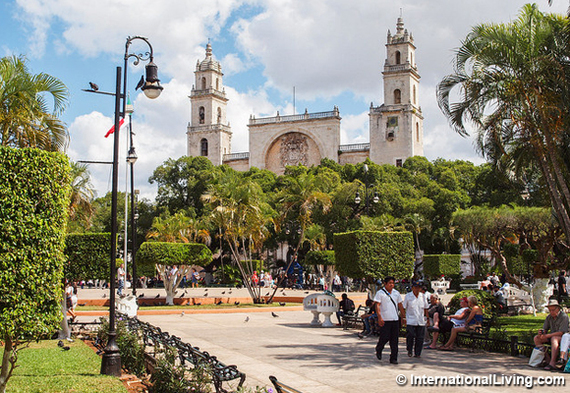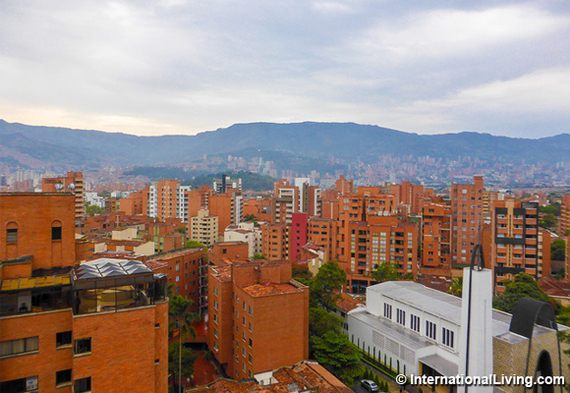We write about retiring overseas. It's what we know. And we admit we've not lived in the U.S. for 15 years now ... Still, we do know something about the retirement concerns of our friends and fellow baby boomers that are still working in the U.S. today.
In just a couple of words: They're worried.
Plaza Grande in Merida, Mexico
This concern and apprehension about the future is illustrated big time in the annual retirement survey released recently by the Transamerica Center for Retirement Studies (TCRS).
A non-profit, private foundation dedicated to educating the public on emerging trends and retirement security in the U.S., the TCRS has been conducting this survey for 17 years now -- since 1998. It's one of the longest-running and largest national surveys of its kind.
A good mix of workers -- pretty evenly divided between Millennials, Generation X, and Baby Boomer workers, took the survey. A much smaller group of workers -- those born prior to 1946 -- also participated.
Not too surprisingly, the TCRS concludes that American workers "are challenged by what has become a wobbly three-legged stool comprising Social Security, employer-sponsored retirement benefits, and personal savings."
That's analytical speak that essentially means that millions of Americans aren't prepared for retirement. When it comes to our generation ... specifically to baby boomers hoping to retire soon...the wobbly stool is indeed precarious. 
Medellin Skyline, Colombia
Here's What Baby Boomer Workers in the TCRS Survey Say about Retirement:
• They're planning to work until an older age than previous generations -- 66 percent plan to or are already working past age 65, or do not plan to retire at all. Many expect to continue working in retirement, at least on a part-time basis, because of income or health benefits.
•Most baby boomers (87 percent) expect Social Security will be a source of their retirement income and one in three (34 percent) expects it to be their primary source of income. Only 33 percent expect income from a traditional pension plan.
•The current median household savings in all retirement accounts among baby boomer workers is $147,000. (Many baby boomers were already mid-career when 401(k) plans were first introduced and they've not had a full 40-year time horizon to save in one.)
So what's the Solution, According to the TCRS Experts?
Working longer and fully retiring at an older age is one solution. But that's only if you can stay employed in the first place. The trend among employers today is to hire young people who will work for lower salaries. And of course, you have to stay on top of the technology required for some jobs. And you have to stay healthy....
The TCRS analysts offer seven recommendations to help American workers prepare for retirement. These include saving money, asking for retirement benefits as part of your compensation plan, seeking out tax credits, and taking proactive steps to ensure your long-term employment. All of these, of course, are easier said than done.
But here's the recommendation offered that makes the most sense to us: "Develop a retirement strategy. Factor in living expenses, healthcare needs, government benefits and long-term care. Envision future retirement and have a backup plan in case retirement comes early due to an unforeseen circumstance."
In our world, in fact, your "backup plan" should be your blueprint to early retirement. Unless you really love what you do, why work any longer than you have to?
Let's Do It Together, Right Here ... Let's Develop a Retirement Strategy That Works for You...
Your retirement living expenses: In the TCRS data, 76 percent of baby boomers surveyed say "affordable cost of living" is a very important criterion for choosing where to live in retirement. As we've already mentioned, 87 percent of baby boomers surveyed say they expect their Social Security benefits to fund their retirements.
The average monthly U.S. Social Security benefit being paid out in 2016 is reported at $1,341. You may get more; you may get less, depending on your work history. And let's say you have, as the TCRS survey indicates the average baby boomer does, savings of $147,000.
Can you comfortably and affordably live on that amount in the U.S.? Statistics say the annual cost of living in the U.S. for a single adult with no children is $28,474. We'd guess that would be some mighty frugal living ... and that amount is equal to about $2,400 a month. That Social Security benefit of $1,341 isn't going to cut it ... your standard of living will be at a bare minimum and you'll quickly dip into and deplete your savings.
But here's the thing ... you can live well on $1,341 a month in many locations overseas. In Ecuador ... Nicaragua ... Colombia ... Peru ... Southeast Asia ... On that amount, you can pay for your rent, your healthcare, eat better than you ever imagined... You really can live well on a Social Security budget.
If you're part of a couple -- and you have a monthly income of $2,000 or so -- you can live very well indeed when you retire overseas. You'll even have enough money to travel now and then...
In our book, The International Living Guide to Retiring Overseas on a Budget, we list dozens of locations where you can retire--easily and affordably--on $25,000 a year or less. (Our monthly expenses in Ecuador where we live now are less than $1,500 a month...we know it can be done.)
By the way, on a $2,000-a-month budget overseas, a couple receiving the average 2016 Social Security income can live without drawing down their savings. Instead, you can count on it being there if you need it.
What about healthcare? In the last survey conducted by the World Health Organization on the quality of healthcare around the world, the U.S. ranked #37. That means there are 36 countries with healthcare systems of better quality than the U.S.
In many of these countries, you'll find affordable healthcare options, as well. In Ecuador, for instance, a couple can join the IESS government healthcare plan for just about $80 a month. There are no exclusions for pre-existing conditions, and this amount covers doctor's visits, surgeries and treatments, prescriptions, and more.
Costa Rica has a similar program with its CAJA system. So do Colombia, Mexico, and most other popular overseas retirement destinations...
Or opt for a private health insurance plan that will cover you at the country's best medical facilities and hospitals. You'll likely pay one-fourth of the cost of a similar policy in the U.S. (By the way, in many overseas retirement destinations, you'll find great options for long-term care, and at a fraction of what it might cost you in the States.)
And of course, there are far more reasons to consider an overseas retirement. Fun. Adventure. Exposure to a very different culture. These are all great reasons to consider retiring overseas. And many of the destinations that you might consider may actually be closer to family and friends than where you live now. A flight to Costa Rica, Nicaragua, or Panama, for example, can take less time than flying from New York to Los Angeles.
So what do you think? Are you ready to at least consider retirement overseas as your Plan B ... or maybe even your Plan A? As the expert sociologists at the TCRS recommend, it's wise to have a strategy. You may find you can even retire earlier than you ever expected. At the very least, it surely makes sense to get started on your research now.
This article comes to us courtesy of InternationalLiving.com the world's leading authority on how to live, work, invest, travel, and retire better overseas.
Feria in Cartago, Costa Rica
Related Articles
Infographic--Your Social Security Payments Overseas
4 Countries with the Best Healthcare in the World
The Easiest Places to Retire Overseas In 2016
Earlier on Huff/Post50:

